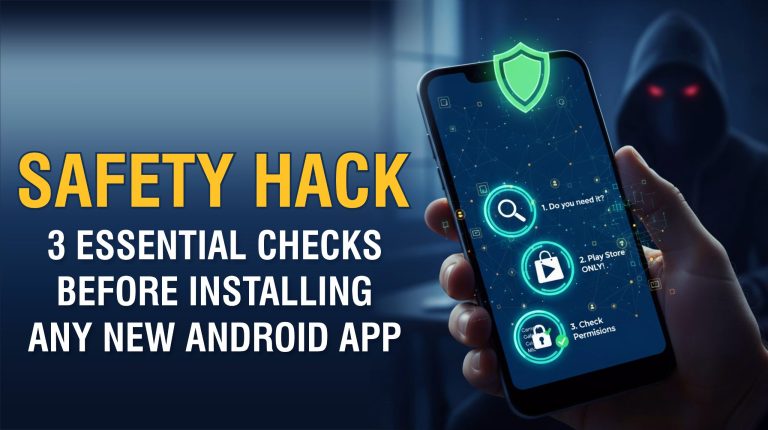In the world of social media and Android, freedom comes with responsibility. Every time you download a new app, you’re essentially handing over a key to your personal digital life. To stay safe from hackers, data theft, and hidden malware, you can’t afford to be careless.
Protecting your privacy is simpler than you think. You just need to follow these three essential checks before you tap “Install.”
The Necessity Check: Do You Really Need This App? 🤔
The first line of defense against digital risk is minimizing your digital footprint. Most people have apps on their phones that they rarely, if ever, use.
Before searching for a new app, ask yourself: Is this an essential function or a fleeting novelty?
The Risk of Clutter
Apps that seem harmless—like simple WhatsApp status downloaders, baby name, or niche photo filters—can still be engineered to harvest data or run in the background, consuming battery and resources.
The Golden Rule
If you can complete the task using your phone’s built-in browser (e.g., searching for baby names on Google instead of downloading an app), don’t install the app. Every unnecessary app you install adds a new potential vulnerability to your device.
The Source Check: Always Use the Official Google Play Store
You’ve decided the app is necessary. Now, where do you get it? This step is absolutely critical: Always install apps only from the official Google Play Store. Never download an APK (Android Package Kit) file directly from a website, a third-party store, or an unverified link.
The Danger of Unknown Sources
Installing apps from unverified sources bypasses the crucial security checks put in place by Google. When you download a rogue APK, you risk:
Malware and Trojans
Hackers often disguise malicious code within APKs for popular apps (like cracked games or utility tools). These apps can contain Spyware to steal passwords and financial details, Adware to flood your phone with unwanted pop-ups, or even Ransomware that locks your entire device and demands a payment.
Remote Control
Some malware, like certain Remote Access Trojans (RATs), can grant the attacker full remote control of your infected device. This means they can read your SMS messages (and intercept bank OTPs!), record you using your camera and microphone, or access your files without your knowledge.
No Quality Assurance
Apps from unknown sources haven’t been tested for compatibility, leading to constant crashes, performance lag, and excessive battery drain.
The Official Advantage
The Google Play Store constantly scans apps for malicious code and removes them when threats are detected. While not 100% foolproof, it remains the safest and most reliable distribution channel for Android apps.
The Permission Check: Question Every Request
Even if you install an app from the Play Store, your guard must remain up. The single most important safety action you take after installation is managing app permissions.
When an app asks for permission to access something on your phone—like your Camera, Microphone, or Contacts—you need to operate on the “Principle of Least Privilege.”
If an app doesn’t need a resource to perform its core function, DENY the request.
| Permission | Suspicious for Apps Like… | When is it OK to Grant? |
| Camera/Gallery | Baby Name Apps, English Learning, Calculator, Simple Games | Social Media (TikTok/Instagram), Photo Editors, QR Scanners |
| Microphone | Weather Apps, Shopping/Finance Trackers, Reading Apps | Voice Recorders, Messaging Apps (for voice notes/calls) |
| Contacts | Flashlight Apps, Note-taking Apps | Messaging Apps, Social Media (for finding friends) |
| Location (Always On) | Simple Games, Image Editors | Navigation Apps (Google Maps), Delivery Services |
The Danger of Granting Unnecessary Access
Any permission you grant can be used by the app owner without your knowledge or prior notice.
For example:
- A “simple game” that has Microphone access could be silently listening to your conversations and selling that data for targeted advertising.
- A Baby Name app that accesses your Gallery can copy your private photos and documents to a remote server.
Be mindful
Granting permission to the camera or microphone means the app can potentially record you at any time, even when you think the app is closed.
Bonus Tip: Audit and Automate Your Security
Your digital safety is an ongoing process. Don’t set your permissions once and forget them.
Regularly Review Permissions: Periodically go into your phone’s settings Settings > Privacy > Permission Manager and review which apps have access to sensitive data like Location, Camera, and Microphone. Revoke access from any app that doesn’t strictly need it to function.
Uninstall Unused Apps
Delete any app that you haven’t used in the past month. They are just dormant security risks and wasted storage space.
Use Automatic Reset
Most modern Android versions have a feature that will automatically reset permissions for apps you haven’t used recently. Make sure this feature is turned on in your device settings.

